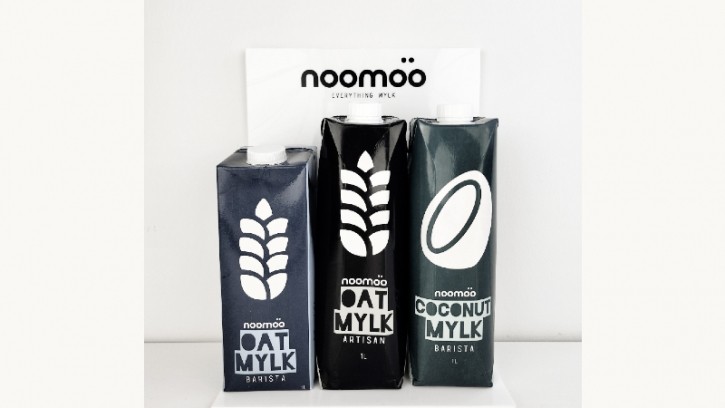Not only oats: Singapore’s noomoo wants to become Asia’s ‘first’ all-encompassing plant-based dairy alternative brand

Launched in January, noomoo is banking on “variety, flexibility and adaptability” to bridge existing gaps in Asia-Pacific’s plant-based dairy alternative (PBDA) market.
“Right now, there is not really an Asian representative in the PBDA space that has an all-encompassing portfolio. Most brands are focused on one type of product, such as oat milk, or extension of the same product, such as oat ice cream. We aim to become the brand of choice that covers the spectrum of PBDA in both breadth and depth,” Nick Chan, Chief Action Officer (Marketing and Operations) of noomoo, told FoodNavigator-Asia.
noomoo’s current line-up consists of two versions of Oat Mylk (Barista and Artisan) and one Coconut Mylk. It is looking to launch a third type of oat milk as well as soy and almond milks by early 2024.
“The products are geared towards application [by professional baristas], although regular consumers can also buy them. Moving forward, we will create a range that is more direct consumption-friendly, including RTD items. We can also do coconut ice cream, soy pudding, almond yoghurt, etc.
“We are not just expanding our offerings, but also building our brand as a PBDA spanning different plant types and categories, so people will understand that we are ‘not only oat’. Hopefully, this will also drive more innovation in Singapore’s F&B scene, such as new drink recipes using our milk products.”
Another area that noomoo focuses on is the nutritional value of its products.
“We put a lot of emphasis on nutrition. Our Oat Mylk contains 1.4g of protein per 100ml serving. We use ingredients like low-sodium lake salt to reduce sodium levels by 50%, and oats of different origins for varied natural flavours without any added sugars.
“There are brands that create flavour profiles unique to them, and these flavours are usually dominant. But for noomoo, we want the flavour of the coffee or beverage to come through. We want our Mylks to complement and balance the taste, not overpower it,” Chan added.
Business development plans mapped out
Currently, noomoo’s primary focus is on boosting B2B and online sales, with its products available on e-commerce platforms like Amazon, Lazada, and Shopee.
“There are many different PBDA products in the market. If B2B customers say that our products are good, it is easier to convince consumers. By working with other F&B businesses, we are given insights on what baristas and menu creators expect, and what consumers are looking for.
“Our goal is to create staples, and ultimately, to put noomoo on every table. For that to happen, we need to make products that truly cater to people’s daily consumption habits. With the industry knowledge, we can fine-tune and develop better products for everyone,” Chan shared.
When the brand has gained sufficient traction, the next phase of development is to expand retail channels to physical stores, such as supermarkets.
“At the moment, we are trying to extend our reach as much as possible. Come January 2024, we hope to widen our retail channels and let more people know about our brand. Having a range of PBDA that experts are using and that consumers are buying via e-commerce reflects a demand for our Mylks. This gives both retailers and us the confidence that [our products] will not just sit on the shelves.”
Beyond Singapore, noomoo has set foot into Malaysia and formed a team in China to devise strategies to take on the competitive local market.
The brand also named Thailand, Japan, Korea, Hong Kong, Brunei, Philippines, and Vietnam as its target markets.
“These are the countries where we are looking for the right strategic partners to work with. We plan to go into the metropolitan cities or areas of these markets, while adopting the same approach as we did in Singapore — we want to prove our products on a professional or Horeca level first, so consumers will be more inclined to come onboard,” said Chan.
Undeterred by plant-based fatigue
While the plant-based industry appears to be experiencing a post-hype slump in some regions, Chan is optimistic about the potential of PBDA in APAC.
“The plant-based meats space had looked very bright, but the challenge is that the transition cost for the consumer is very high. In this region, these products belong to the premium category — unless it’s motivated by personal belief or health needs, there is no real reason for consumers to pay two to three times the price of animal meat for plant-based alternatives.
“In contrast, transition is relatively easy or unnecessary for PBDA. Consumers in many Asian countries have been drinking soy milk or rice milk since young, so they are no stranger to plant-based milks. People who choose PBDA are looking for a better-for-you product [rather than a substitute].”
Chan added that the PBDA industry is “primed for growth”, citing data from market research reports, including a projected CAGR of approximately 15% for oat milk from now till 2026.
“PBDA is premiumised to a degree that matches the rising income levels of consumers across Asia. In particular, the younger generation want to do their part for sustainability, and are well aware of their dietary needs, such as lactose intolerance. These factors are fuelling the growth of this sector.
“Our fundamental business mission is to convert people from dairy to plant-based. We’re not fighting against other PBDA players. In fact, we are thankful for all the brands that are constantly pushing boundaries, which has significantly increased awareness of issues like sustainability and animal cruelty. On our part, we are continuously trying to bring the affordability level closer to dairy to encourage more people to switch. It requires a collective effort to advance the PBDA sector.”




